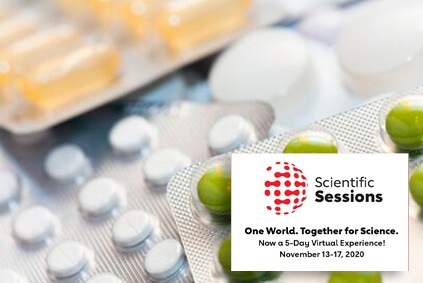High risk patients undergoing elective PCI treated with a more potent antiplatelet scheme (ticagrelor) vs. the classic clopidogrel do not see a benefit in protection against periprocedural events and instead see increased costs and minor bleeding rate. These are the outcomes of the ALPHEUS study presented at AHA 2020 simultaneously published in the Lancet. Ticagrelor…
AHA 2020 | POLYPILL: One Pill Plus Aspirin to Treat Everything
Using only one compressed tablet or pill with a fixed combination of statins, angiotensin-converting enzyme inhibitors, beta-blockers, and diuretics significantly lowered cardiovascular risk in a large population without previous events (primary prevention). However, it presented an intermediate risk of cardiovascular disease onset. The TIPS-3 (The International Polycap Study 3) study had a 2-by-2-by-2 factorial design,…
AHA 2020 | AFFIRM-AHF: Ferric Carboxymaltose and Fewer Hospitalizations for Cardiac Failure
Correcting iron deficiency in patients with cardiac failure might reduce the risk of new hospitalizations according to the AFFIRM-AHF published in the Lancet and presented at AHA 2020. The combined primary end point of death and hospitalizations was not met; yet the study showed a significant reduction of 26% in hospitalization rate. Irrespective of the…
AHA 2020 | Statins: Confirmed Benefits for the Elderly
Elderly patients (>70) with high cholesterol levels have been systematically excluded from randomized studies on statins, despite their higher risk of cardiovascular events. Presented at AHA 2020 Scientific Sessions and published simultaneously in the Lancet, along comes this primary prevention study including patients between 70 and 100 years of age. The use of therapies to…
Pro-Inflammatory Diet and Its Potential to Trigger Cardiovascular Events
As interventional cardiologists, we cannot delegate the responsibility of providing adequate advice on healthy habits. More importantly, we cannot be ignorant about them. Our medical intervention does not end with the final angiography; this is actually the beginning, since cardiovascular disease is chronic. This paper assessed the important role played by inflammation on cardiovascular disease…
Antiplatelet Therapy in Elderly Population: Are the New P2Y12 Inhibitors Safe?
Should elderly patients stick to clopidogrel? The first large study on prasugrel showed an unacceptable increase of bleeding in elderly patients, suggesting the use of 5 mg (although the sample size was small, which hindered the determination of dose efficacy). Later, ticagrelor showed better efficacy than clopidogrel without apparent safety concerns. However, specific evidence on elderly…
Ticagrelor or Prasugrel in ST Elevation MI
In patients undergoing ST elevation acute myocardial infarction (STEMI) receiving primary PCI, no significative differences between prasugrel and ticagrelor were found. However, the latter was associated to a significantly higher number of repeat MI when considered separately. Few studies have compared the efficacy and safety of the two most potent oral P2Y12 receptor inhibitors in…
Angioplasty in Aspirin-Free Stable Patients with Prasugrel: Innovation Continues
Potent P2Y12 receptor inhibitors, such as prasugrel and ticagrelor, have been tested mainly in a setting of acute coronary syndromes. There is little evidence on stable patients, particularly for prasugrel. Designing a study with that purpose seemed challenging enough, but adding aspirin discontinuation in patients without a particularly high bleeding risk took this research to…
Is Loading NSTEMI with DAPT Convenient?
Pretreating non-ST elevation acute myocardial infarction (NSTEMI) patients with P2Y12 receptor inhibitors is not associated with improved clinical outcomes as it is to increased bleeding. NSTEMI patients are often treated with platelet antiaggregants in the daily clinical practice despite the lack of evidence for its benefits. This Swedish registry prospectively included 64857 patients undergoing NSTEMI…
TCT 2020 | Ticagrelor Monotherapy After ST-Segment Elevation Infarction
Ticagrelor monotherapy after 3 months of dual antiplatelet therapy in patients who experienced ST-segment elevation infarction significantly reduces major bleeding without increasing ischemic risk. This pre-specified analysis of the TICO study shows that ticagrelor monotherapy is safe even in patients with higher ischemic risk. Interrupting aspirin use after 3 months of dual antiplatelet therapy and continuing treatment…
TCT 2020 | Xience in Favor of Short Dual Antiaggregation Therapy with High Bleeding Risk
Following with aspirin alone after a short period of dual antiaggregation therapy (DAPT), 1 to 3 months, did not increase ischemic events in patients receiving a Xience stent while significantly reducing bleeding. This study endorses the safety of short DAPT with contemporary drug eluting stents (DES) in patients presenting high bleeding risk. The XIENCE Short…










